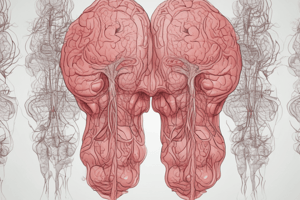Podcast
Questions and Answers
What should be avoided when treating high blood pressure to prevent worsening brain ischemia?
What should be avoided when treating high blood pressure to prevent worsening brain ischemia?
- Sudden cessation of exercise
- Sudden increase in cholesterol levels
- Sudden marked reduction of BP (correct)
- Gradual reduction of blood glucose
Which drug is indicated for improving the brain's microcirculation?
Which drug is indicated for improving the brain's microcirculation?
- Statins
- Pentoxifylline (Trental®) (correct)
- Anti-hypertensive drugs
- Piracetam (Nootropil®)
What is the threshold for BP to administer anti-hypertensive drugs?
What is the threshold for BP to administer anti-hypertensive drugs?
- 200/120 mm Hg (correct)
- 180/100 mm Hg
- 220/140 mm Hg
- 150/90 mm Hg
Which of the following lifestyle modifications is recommended for managing BP?
Which of the following lifestyle modifications is recommended for managing BP?
What is the primary benefit of using statins in risk factor treatment?
What is the primary benefit of using statins in risk factor treatment?
Which drug increases oxygen consumption in the brain?
Which drug increases oxygen consumption in the brain?
Which of the following statements about Pentoxifylline (Trental®) is correct?
Which of the following statements about Pentoxifylline (Trental®) is correct?
Why is smoking cessation recommended in the care of blood pressure?
Why is smoking cessation recommended in the care of blood pressure?
Which action is crucial to lower the risk of reducing cerebral blood flow during BP treatment?
Which action is crucial to lower the risk of reducing cerebral blood flow during BP treatment?
Which of the following is NOT a recommended lifestyle change for BP management?
Which of the following is NOT a recommended lifestyle change for BP management?
Flashcards are hidden until you start studying
Study Notes
General Principles of Stroke Treatment
- Stabilize the patient's general condition
- Give therapy directed at specific aspects of stroke pathogenesis
- Treat complications
- Initiate early secondary prevention measures to reduce incidence of stroke recurrence
- Begin rehabilitation measures
Acute Ischemic Stroke Treatment
- Thrombolysis with recombinant tissue plasminogen activator (rt-PA) using alteplase
- Given within 3-4.5 hours from the onset of symptoms (golden time window)
- Inclusion criteria: symptoms suggestive of ischemic stroke, able to initiate treatment within 4.5 hours, age 18 years or older
- Contraindications: intracranial hemorrhage, brain CT demonstrates large infarction, elevated blood pressure, recent head trauma or neurosurgical operation, INR > 1.7, thrombocytopenia, recent use of heparin or direct oral anticoagulants, intracranial neoplasm, or aneurysm, active internal bleeding
Complications of Stroke
- Bleeding
- Intracranial and extracranial hemorrhage
- Angioedema
Intra-Arterial Mechanical Thrombectomy (IAMT)
- Thrombectomy devices can be useful in achieving recanalization alone or in combination with pharmacological fibrinolysis
- Indications: large artery occlusion in anterior cerebral circulation
Secondary Prevention of Ischemic Stroke
Antiplatelet Agents
- Aspirin: 75-325 mg/day
- Clopidogrel (Plavix): 300 mg load, then 75 mg/day
Anticoagulants
- Warfarin (Marevan): indicated in hypercoagulable states, cardiac sources like AF or intracardiac thrombi
- Dabigatran (Pradaxa): indicated in persistent or paroxysmal non-valvular AF
- Rivaroxaban (Xarelto): factor Xa inhibitor, reduces the risk of stroke and systemic embolism in non-valvular AF
Risk Factors Treatment
Care of Blood Pressure (BP)
- Anti-hypertensive drugs if BP is above 200/120 mm Hg, with very gradual reduction
- Avoid sudden marked reduction of BP, which decreases cerebral blood flow and worsens brain ischemia
Other Treatments
- Statins and cholesterol-lowering agents: shown to lower the risk of atherosclerotic mortality and vascular events, including stroke
- Smoking cessation, DM control, a low-fat low-salt diet, weight loss, and regular exercise
Other Drugs
- Piracetam (Nootropil): improves brain metabolism by increasing O2 consumption
- Pentoxifylline (Trental): improves the microcirculation of the brain by increasing RBCs deformability and reducing platelet aggregation
Studying That Suits You
Use AI to generate personalized quizzes and flashcards to suit your learning preferences.





